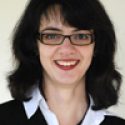Senior computer science major Nadya Pena has always felt like the newbie. She started at the College as a mathematics major and then switched to engineering, interactive multimedia, and English. She finally decided on computer science in her junior year.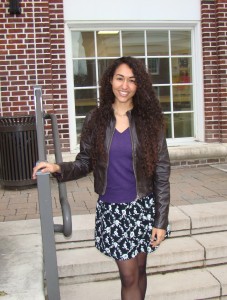
It was during her time as a mathematics major that she discovered her true passion through a required computer science class. “I went in there not understanding computers. I was a technophobe,” she says, remembering how she never once considered herself tech-savvy. However, computer science soon clicked with her. “It was interesting and fun and something that I could do,” she says. Fast forward to the end of her senior year and this accomplished computer science major says, “I’m really lucky I fell in love with something so in demand. You can really do anything with it: healthcare, financial software, even Sephora has microchip makeup.”
With many students in her major having taken computer science courses in high school, Pena felt that she started a step behind among her peers. But despite having a late start in the field, she has accomplished so much during her college career. Currently, she is the president of the Association of Computing Machinery and the treasurer of Women in Computer Science (having previously served as president). She is also a member of the Sigma Sigma Sigma sorority and works for TCNJ’s Residential Networking Services.
Nadya has overcome her natural shyness to take on leadership roles, explains Dr. Monisha Pulimood, chair of the Computer Science Department and Pena’s academic advisor. “I attribute her ‘detours’ to a prior lack of awareness of the field due to insufficient exposure and a scarcity of role models in high school.” With this in mind, Pena has worked to increase awareness of computer science to younger students. She teaches children in grades K-12 how to program and also helps girls and minorities learn coding to help them become better represented in the field. Professor Pulimood adds, “Nadya exemplifies the ‘growth mindset’ and stands out as a role model for young people, particularly those from groups that are underrepresented in computer science and who may be on their own journeys to discover their passions.”
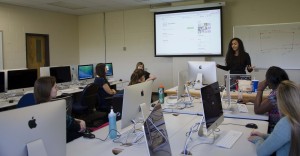 Pena is also a first-generation college student, owing a lot to her mother, a single parent who went above and beyond to make sure her children received a college education. “My mother is perseverant and beat the odds while keeping a positive attitude in the face of adversity,” says Pena, whose family emigrated from the Dominican Republic. “We’ve done well for ourselves, and I’m very grateful for my mom.”
Pena is also a first-generation college student, owing a lot to her mother, a single parent who went above and beyond to make sure her children received a college education. “My mother is perseverant and beat the odds while keeping a positive attitude in the face of adversity,” says Pena, whose family emigrated from the Dominican Republic. “We’ve done well for ourselves, and I’m very grateful for my mom.”
A member of the Educational Opportunity Fund (EOF) program at the College, Pena is also part of the iPics Scholarship Program (a math and computer science joint program) and won a scholarship at the national Grace Hopper conference held in Texas. In addition to her leadership positions and stellar work ethic, Pena has created numerous projects illustrating her adroitness in the computer science field.
Nadya developed a program in which a television viewer can text the name of a show and receive information on whether the episode currently being aired advances the plot of the series or if it was a “stand-alone” episode. While it started as a class project, Pena has continued with it independently and the program has now become her passion project. Another program she has worked on is a system to monitor the number of spaces in a parking lot by using tiny credit-card sized computers.
Pena has done three internships in software development: Prudential Financial, Wiley and Sons, Publishing Company, and Credit Suisse, where she also landed a summer job writing software for stock traders.
As to what her dream job would be, Pena hasn’t decided yet. She wants to teach a computer science class but also considers freelancing as a possible option. “I definitely want to work on interesting problems and solve them with computers,” she says. “Any job that allows me to do that, I’m okay with.”
– Kelly Corbett
For More Information:



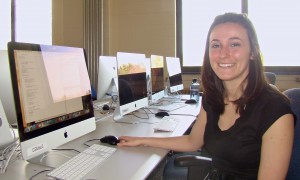 Fortunately, she was given the chance to sit in on a couple classes at TCNJ while deciding which school to attend. Gorman says she fell in love with the small class sizes, which helped the professors know all their students by name.
Fortunately, she was given the chance to sit in on a couple classes at TCNJ while deciding which school to attend. Gorman says she fell in love with the small class sizes, which helped the professors know all their students by name.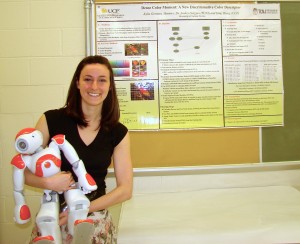 Two professors at the College, in particular, have really inspired Gorman. She conducted a majority of her research with Dr. Andrea Salgian, who was the professor of Gorman’s first computer science course. Dr. Deborah Knox, whom Gorman had for earlier computer science seminars, also had a huge impact on Gorman. “Her level of confidence as a computer scientist has increased during her career at TCNJ, improving with each challenge she tackled,” says Knox. “Motivated to learn, Kylie is detail-oriented and willing to share her strong technical skills with others, both in a collaborative environment as well as through her role as a tutor of computer science.”
Two professors at the College, in particular, have really inspired Gorman. She conducted a majority of her research with Dr. Andrea Salgian, who was the professor of Gorman’s first computer science course. Dr. Deborah Knox, whom Gorman had for earlier computer science seminars, also had a huge impact on Gorman. “Her level of confidence as a computer scientist has increased during her career at TCNJ, improving with each challenge she tackled,” says Knox. “Motivated to learn, Kylie is detail-oriented and willing to share her strong technical skills with others, both in a collaborative environment as well as through her role as a tutor of computer science.”
 Meet Brandon Gottlob, computer science major and one of the creators of the College’s popular mobile application, TCNJ Connect. The application provides the essentials for navigating TCNJ life as a student, allowing its users to stay updated on vital campus information such as dining hours, resources, calendars, media, and emergency and healthcare options.
Meet Brandon Gottlob, computer science major and one of the creators of the College’s popular mobile application, TCNJ Connect. The application provides the essentials for navigating TCNJ life as a student, allowing its users to stay updated on vital campus information such as dining hours, resources, calendars, media, and emergency and healthcare options.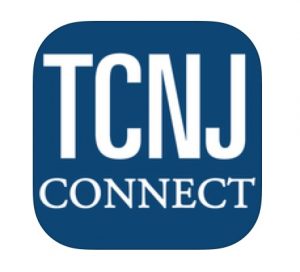 “What surprised me about Brandon was his ability to work with a senior designer as his peer,” says Dr. Knox. “As a freshman, Brandon had a lot to learn, but he wanted to engage at a very high level. He was motivated to learn and did a good amount of self-study to put himself at a level where he could make contributions. His level of commitment and contributions were essential to the success of the completion of TCNJ Connect.”
“What surprised me about Brandon was his ability to work with a senior designer as his peer,” says Dr. Knox. “As a freshman, Brandon had a lot to learn, but he wanted to engage at a very high level. He was motivated to learn and did a good amount of self-study to put himself at a level where he could make contributions. His level of commitment and contributions were essential to the success of the completion of TCNJ Connect.”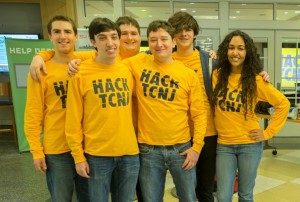 ACM provides the opportunity for members to attend tutorials on a new programming language or platform just introduced in class. In spring 2016, the club hosted HackTCNJ, a 24-hour coding extravaganza known as a hackathon, with prizes going out for the best user experience or the funniest hack. “It’s mayhem,” says Gottlob. “It’s like 200 people hunting for food for 24 hours.”
ACM provides the opportunity for members to attend tutorials on a new programming language or platform just introduced in class. In spring 2016, the club hosted HackTCNJ, a 24-hour coding extravaganza known as a hackathon, with prizes going out for the best user experience or the funniest hack. “It’s mayhem,” says Gottlob. “It’s like 200 people hunting for food for 24 hours.”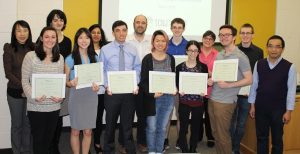 In his final semester, Gottlob received a Senior Award from the computer science department. Dr. Knox, who presented the award, was sad to see her longtime student go. “It has been my privilege to work with Brandon these past four years, both in the classroom and in the research lab,” says Dr. Knox. “It was a special opportunity –-perhaps a once-in-my-career type of opportunity – to mentor an undergraduate for that span of time.”
In his final semester, Gottlob received a Senior Award from the computer science department. Dr. Knox, who presented the award, was sad to see her longtime student go. “It has been my privilege to work with Brandon these past four years, both in the classroom and in the research lab,” says Dr. Knox. “It was a special opportunity –-perhaps a once-in-my-career type of opportunity – to mentor an undergraduate for that span of time.”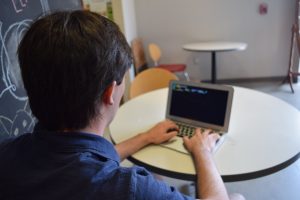 Looking back on his four years at TCNJ, Gottlob hopes that first-year students will not be discouraged from sticking with the major because of its challenges. He can relate to the feeling of dejection when something goes wrong with a program, but he believes that problem solving is one of the most important skills for a computer science major. His advice: “Instead of just thinking, ‘If I put this code in, my program works,’ focus on why that program works. It will give you an understanding of the big picture and also help you become more comfortable with programming and building your own solutions.”
Looking back on his four years at TCNJ, Gottlob hopes that first-year students will not be discouraged from sticking with the major because of its challenges. He can relate to the feeling of dejection when something goes wrong with a program, but he believes that problem solving is one of the most important skills for a computer science major. His advice: “Instead of just thinking, ‘If I put this code in, my program works,’ focus on why that program works. It will give you an understanding of the big picture and also help you become more comfortable with programming and building your own solutions.”
